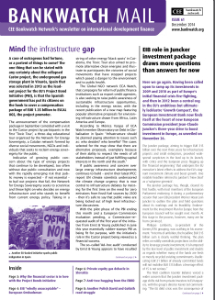European Ombudsman hammers EIB over Bosnian bridge maladministration

Bankwatch Mail | 2 December 2014
An unprecedented ruling and serious tough talking emanated from the European Ombudsman at the end of October following an investigation into the EIB’s involvement with a bridge construction project in Bosnia and Herzegovina. Describing the approach taken by the EIB in the case as “wholly unacceptable”, the Ombudsman’s conclusion pulled no punches in asserting that the bank’s “maladministration risks putting into question the European Union’s commitment to strengthening the rule of law in Bosnia and Herzegovina.”
This article is from Issue 61 of our quarterly newsletter Bankwatch Mail
Browse all articles on the right
During the investigation the Ombudsman, Emily O’Reilly, found that the EIB opted to finance the project – a bridge crossing the River Sava in Bosnia and Herzegovina – in spite of complaints from an Italian company Impresa Pizzarotti & C. SpA which had been excluded from the tender despite having offered the lowest bid.
The EIB’s Complaints Mechanism, an internal body set up in recent years to ensure that the institution complies with its own policies, had ruled that the Italian company’s complaint was valid. However EIB management chose to ignore the ruling from its own policy-enforcing body.
The European Ombudsman found that the EIB management decision was based on an incorrect interpretation of the tender documents. O’Reilly also suggested that she was considering opening an own-initiative inquiry into the “systemic issues” raised by the case.
This latest embarrassment for the self-styled ‘EU bank’ follows related sensitive and controversial cases such as the Mopani mines in Zambia, the Bujagali dam in Uganda, and the Šoštanj coal power plant in Slovenia where EIB management has given the impression of interfering with the work of the Complaints Mechanism.
In the Mopani case, evidence has emerged that management went against a Complaints Mechanism decision to disclose an investigation report and, in the case of Bujagali, EIB president Werner Hoyer has had to formally remind EIB staff to ensure the independence of and cooperation with the Complaints Mechanism office.
In a previous ruling from 2013, the European Ombudsman found that huge delays in the Bujagali case were caused by insufficient staffing of the Complaints Mechanism office and that the release of the Complaints Mechanism assessment of the case was caused by internal pressure within the EIB.
Welcoming the prospect of an European Ombudsman own-initiative inquiry, Bankwatch’s EIB coordinator Anna Roggenbuck commented:
“The Complaints Mechanism was created to give people and affected stakeholders an opportunity to defend their rights, yet this purpose is defeated if the EIB management itself prevents the body from functioning as intended. NGOs have for years complained about this kind of bad practice within the EIB, but it looks like management chooses to run counter to its own standards for the short term interests of its clients, often major corporations.”
Italian job
With the EIB now set to be increasingly in the spotlight as a result of its central role in the newly announced EUR 300 billion EU investment plan, it is coming under increasing pressure to distance itself from and take credible action to prevent its involvement in dubious projects.
However, in July this year Counter Balance urged the EU’s Anti-Fraud Office (OLAF) to open an investigation into the EIB’s handling of the Passante di Mestre project, a motorway bypass around the city of Mestre in northern Italy. The project has attracted notoriety as a result of an ongoing police investigation into possible fiscal fraud and Mafia infiltration via the main subcontracting companies.
Counter Balance alleges that a EUR 350 million EIB loan approved in 2011 and disbursed in 2013 may have been used to refinance a debt related to the principal sub-contracting companies which were under police investigation by the Italian courts at the time.
Yet the EIB has at no stage considered pulling out of the project, which has also been approved by the EIB’s board as the first Italian project to receive co-financing via the Project Bonds Initiative.
Read more
Final ruling of the European Ombudsman on the Sava Bridge in Bosnia and Herzegovina
Theme: Transport
Location: Bosnia and Herzegovina
Tags: BW Mail 61 | BiH | Bosnia | Gazela | Ombudsman | accountability
Never miss an update
We expose the risks of international public finance and bring critical updates from the ground. We believe that the billions of public money should work for people and the environment.
STAY INFORMED
